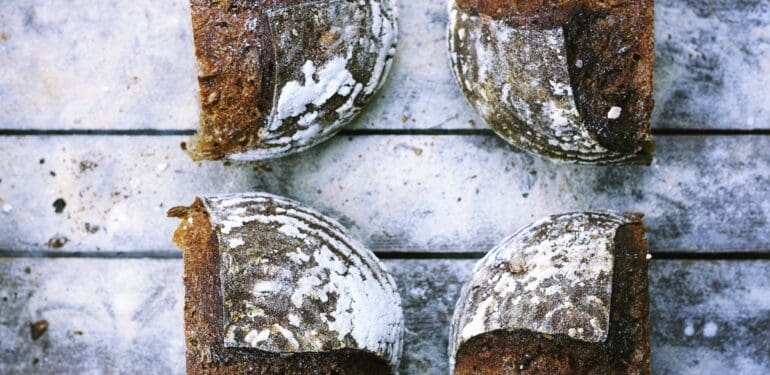If you often visit the grocery store for bread, you probably know that there you dozens of bread options—white bread, whole-wheat, multigrain, the list goes on and on. There’s probably one type of bread that you might notice on the rack that you don’t know a lot about: rye bread. This bread is recognizable for its dark brown color that attracts attention and makes people curious about the taste and ingredients. You might have heard from your friends that rye bread is tasty and healthy, much better than white bread, but is this loaf really the powerhouse of energy and health ingredients that people say it is. Can it keep you healthy and lose weight?
What is rye bread?
Just like wheat, rye is a type of grain that is used for human consumption in its whole and refined form. Rye in its whole-grain form gives the bread a deep brown color, while those options made from refined rye flower have a slightly lighter color that’s still brown. Rye has less gluten than wheat, so the bread is denser, and thanks to its sourdough method of preparation, you can expect a pleasant sour flavor.
It’s filling

Rye has a plethora of benefits for the human body: it’s high in protein, low in fat and rich in nutrients like copper, magnesium, manganese, phosphorus, B vitamins and many other vitamins and minerals. However, what puts rye bread at the top of the health bread list is its high fiber content. Unlike wheat and other grains, rye is rich in fiber (both in its endosperm and bran) so it has a lower glycemic index. Simply put, its high fiber content means the body has a harder time breaking carbohydrates into glucose which is very good for your diet and health. Because fiber is the part of a plant that’s hard for the body to break down, it will pass through your digestive tract undigested. If you drink plenty of water as well, you will feel full and satisfied for longer, have a proper-functioning digestive system and lower the risk of heart disease and diabetes.
It’s low on gluten
Just like most grains, rye also contains gluten, but in smaller amounts. If you suffer from conditions like Celiac disease, you will still feel the effect of rye flour. However, unlike wheat bread, rye lacks one ingredient—wheat germ agglutinin, one small lactin that sparks inflammations and anti-insulin properties in people who suffer from gluten intolerance. So if you’re not gluten intolerant and just want to cut back on this ingredient, rye is a great choice that’s easy to come by. Even if your grocery store or local bakery doesn’t sell rye bread, you can grab rye flour online and prepare your own delicious bread. When you have all the ingredients, check out recipes online and take up bread baking—it’s very fun and rewarding.
It doesn’t spike your insulin levels

Here’s another reason why rye bread is better for you: sourdough. Traditional rye bread is made with a sourdough starter instead of yeast to boost bread rising. The acid from sourdough, combined with high fiber content in whole-grain rye, will provide this bread with a low glycemic index. Low glycemic index foods don’t spike your blood sugar and insulin, making you feel better, more energized and more balanced.
It can balance your hormones
If you suffer from estrogen deficiency, you might benefit from rye consumption. Rye bread is rich in plant-based compounds that have a similar effect to estrogen. Eating foods rich in these compounds can improve your estrogen levels and aid hormonal balance. Additionally, rye bread consumption can improve heart function thanks to its high levels of magnesium that controls blood pressure and high levels of fibre that lowers cholesterol.
If you’re looking for a tasty and healthy alternative to white bread, look no further than rye. This bread will provide you with all the taste and texture enjoyment while blessing you with a variety of health and diet benefits, so feel free to go dark with your bread today!



Pingback: How to Make Perfect Rye Bread - Divine Magazine